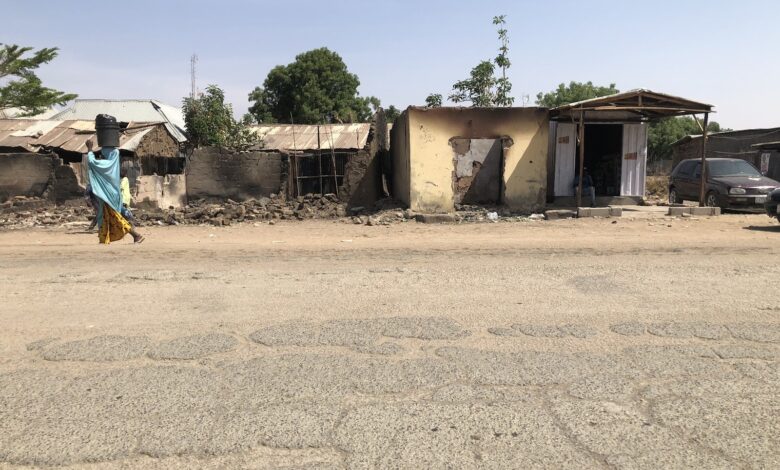Once Intimate, Two Adamawa Communities Torn Apart By Land Dispute
A conflict that began with a verbal attack over farmlands has degenerated into violent attacks, causing deaths and destruction of properties in Northeast Nigeria.

Haruna Ali, 96, is one of many residents affected by the violent disputes between the Lunguda and Waja communities in Lamurde, Adamawa state.
He told HumAngle the violence ruined his business and also separated him from his relatives.
“At this age, where will I go? I was born and raised here. I got married, have children and grandchildren here. All these things changed overnight as I moved from being a rich person to someone living on aid,” he said.
“My son was slaughtered because of this horrific land conflict that has nothing to do with us. I am not even a farmer. I am a contractor. Yet, people fail to see that violence doesn’t distinguish.”
The conflict tearing communities apart
The land ownership conflict between Lugunda and Waja has been a perennial problem, recurring every year since 2018. The two ethnic groups have a long history of interdependence.
The Lunguda people were said to have migrated from the Middle East in search of land for agricultural purposes. Many years later, the Waja people also migrated, coexisting peacefully as farmers in neighbouring communities.
The cordial relationship between the two ethnic tribes, however, spoiled in 2018 when they began to fight over limited land and scarce resources for farming around their areas.
Locals told HumAngle that the recurring violence has claimed over 100 lives, with a huge economic cost suffered by residents. The bloody conflict has led to the destruction of not only farmlands but homes and other properties.
The recent clash that occurred on Jan. 2 led to the destruction of four houses and 11 shops. While no life was lost, many members of the two warring communities sustained injuries.
Residents live in fear
HumAngle spoke with residents who told our reporter that the incessant troubles had put most women and children in Lugunda and Waja in palpable fear.
Richard Batari, 60, a teacher and farmer of the Waja tribe, narrated how the conflict destroyed his home and friendship with the Lunguda people.
“I spent 55 years of my life with these people. We grew up together, played football, and went to the same school together. I am practically half Lunguda, and now they no longer talk to me.”
Like Batari, many people are battling the trauma of losing their loved ones to the land conflict.
Efforts to end the crisis
In a bid to end the killings and destruction of properties, Adamawa state governor Ahmadu Fintiri, in 2020, set up a panel to investigate the cause.
During an assessment visit of the Numan Peace Accord committee to the warring communities in 2021, deputy governor Crowther Seth said resources meant for the communities’ development are being used to settle conflicts.
“The prevalence of any form of crisis makes the government divert monies that could have been used for projects and student scholarships in sponsoring reconciliation and reconstruction,” he had said.
Also, the Adamawa state house of assembly, in June 2022, set up a five-person committee to find lasting solutions to the annual bloody clashes in Lamurde.
The committee was set up after a matter of urgent public interest was raised by Myandassa Bauna, a member of the assembly representing the Lamurde constituency.
In the same month, the two communities held a Peace and Reconciliation meeting where they resolved to, henceforth, live in harmony regardless of their past fights.
The meeting had the representatives of the Army, the Police and the Civil Defence Corps in attendance. The security operatives described the meeting as the best and the surest way to achieve lasting peace.
The latest skirmish in January may, however, be a huge drawback to these efforts. But as suspicions continue to linger, with residents expecting the crisis to erupt again, many remain in the area, believing they have nowhere else to go.
“I can’t run away as many people have done,” observed Haruna. “I will stay here. If the conflict ends up becoming the reason why I die, then I know I die in a place where my family is buried.”
Nazir Mohammed is a 2023 HumAngle Accountability Fellow from Adamawa state.
Support Our Journalism
There are millions of ordinary people affected by conflict in Africa whose stories are missing in the mainstream media. HumAngle is determined to tell those challenging and under-reported stories, hoping that the people impacted by these conflicts will find the safety and security they deserve.
To ensure that we continue to provide public service coverage, we have a small favour to ask you. We want you to be part of our journalistic endeavour by contributing a token to us.
Your donation will further promote a robust, free, and independent media.
Donate HereStay Closer To The Stories That Matter




